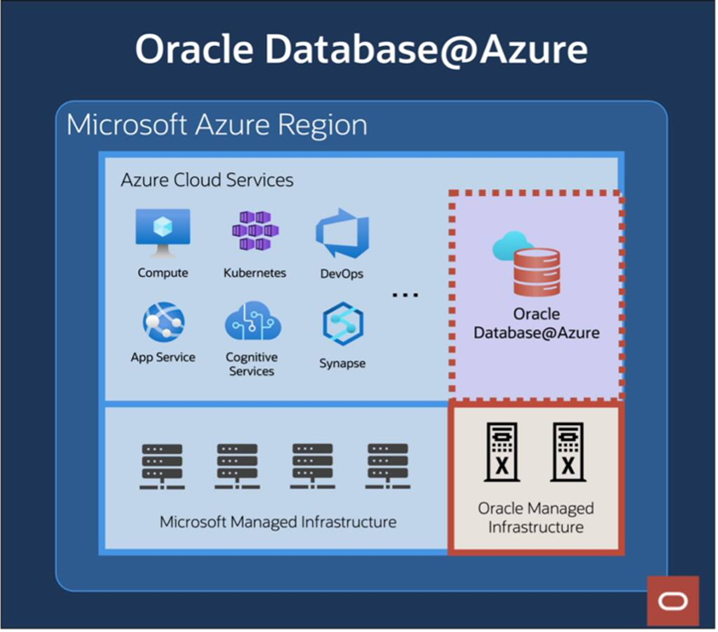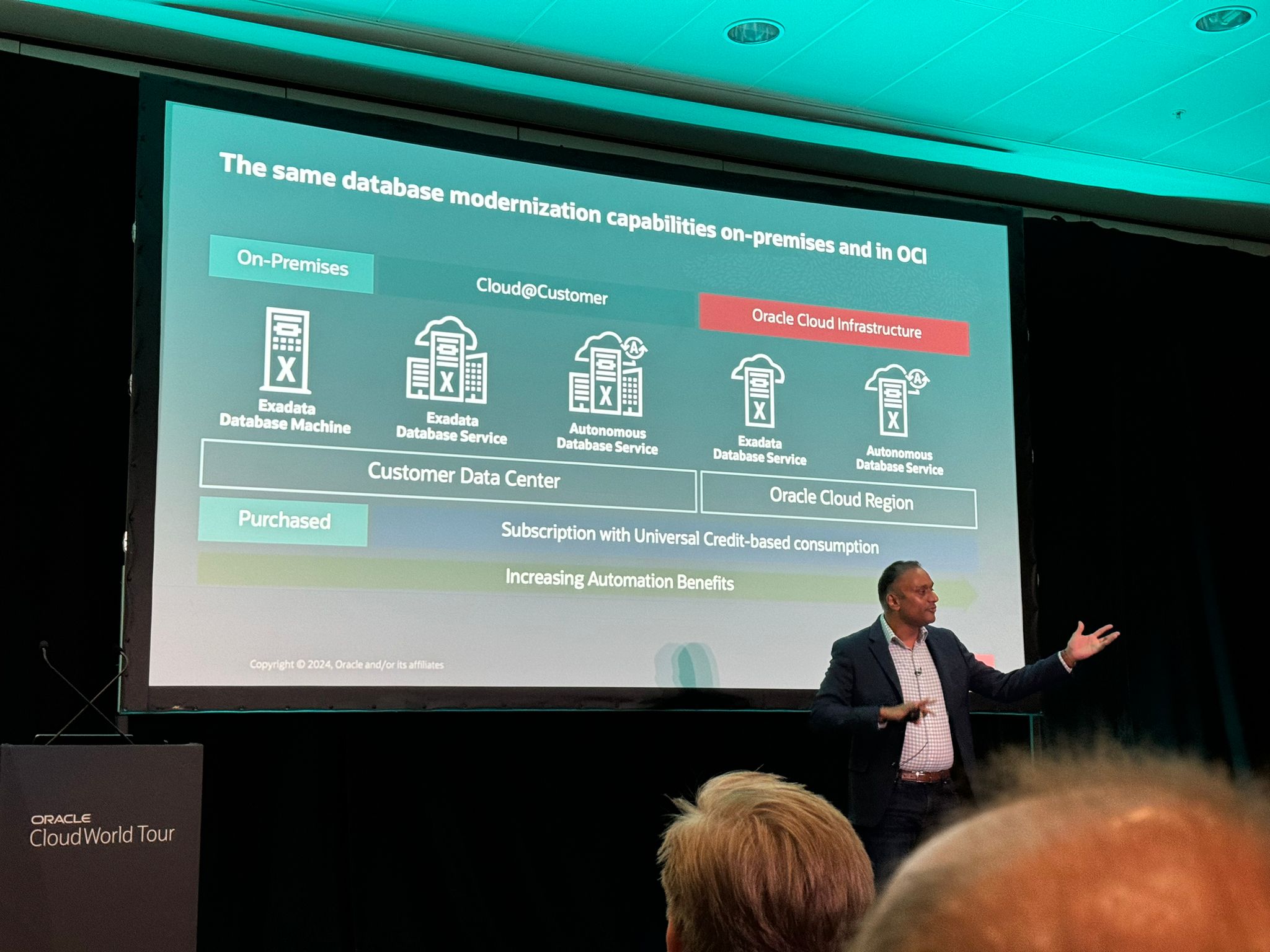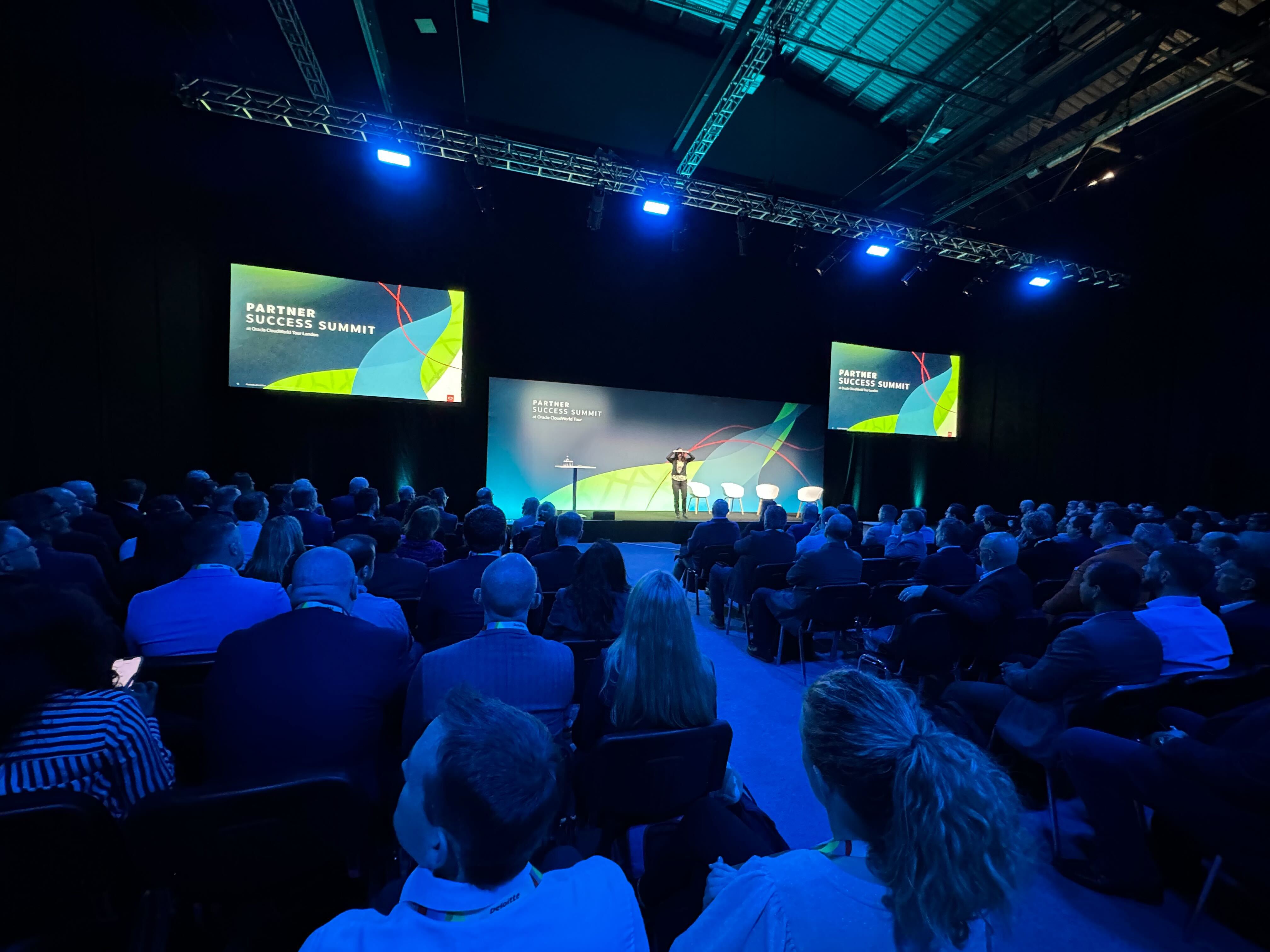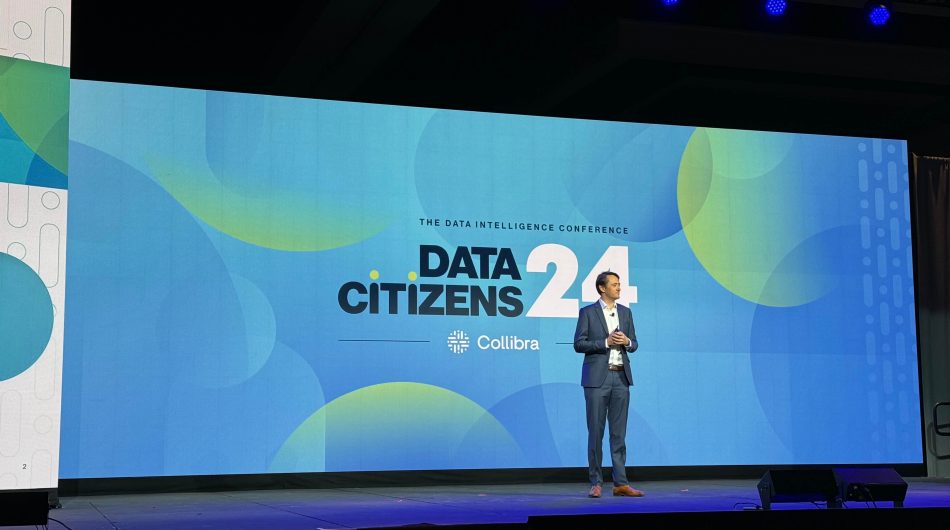
get in touch
At Oracle CloudWorld Tour London 2024, Generative AI stole the spotlight, energized by the evolving Oracle-Microsoft partnership. This collaboration, a buzzworthy topic, underscores Oracle’s diverse cloud offerings, from OCI’s public cloud to tailored solutions like OCI Dedicated Region, catering to every business scenario.
This blog was originally published on the CloudVane website.
Strategic Partnerships Driving Innovation
The recent expansion of the partnership between Oracle and Microsoft is particularly focused on the integration of AI services and cloud infrastructure. While there have been numerous shifts in the cloud landscape over the years, this recent collaborative effort signifies a pivotal moment that could redefine operational efficiencies, data management and customer experiences across industries.
The focus on generative AI (GenAI) and AI Vector Search capabilities, as showcased at Oracle CloudWorld conference in Las Vegas, highlights the move towards embedding AI deeply within cloud services. Oracle’s ambition to integrate GenAI across its offerings and the introduction of AI Vector Search in Oracle Database 23c are clear indicators of the transformative potential AI holds for cloud computing.
Moreover, Oracle’s unique approach to generative AI emphasizes deep text analysis for sentiment detection and offers a nuanced differentiation from Microsoft’s offerings, underscoring the varied paths through which AI can enhance cloud technologies.
The Triple Pillar of Technological Evolution
The Oracle-Microsoft partnership underscores an all-round evolution in the IT industry. Firstly, it demonstrates the critical importance of strategic partnerships in driving innovation at scale. The collaborative approach between Oracle and Microsoft enables both companies to leverage their respective strengths, creating synergies that benefit the broader ecosystem of users and developers.
Secondly, the integration of AI into cloud services signifies a shift towards more intelligent, responsive, and adaptable IT infrastructures. As businesses increasingly rely on cloud technologies for their operations, the inclusion of AI can enhance the efficiency, security, and scalability of cloud services. It can lead to more sophisticated data analysis, improved decision-making processes, and innovative solutions to complex challenges.
Finally, this evolution highlights the growing need for businesses to adapt to a rapidly changing technological landscape. Organizations must remain agile, continuously exploring new technologies and partnerships to stay competitive in an increasingly digital world.
Empowering Partnerships: The Oracle Partner Summit Insight
The Oracle Partner Summit, part one of the two-day event, is dedicated to partners looking to stay updated on Oracle’s technology roadmap, understand Oracle’s business strategy, and discover new opportunities for growth and collaboration within the Oracle ecosystem.
The Strategy update panel was hosted by Doug Smith, SVP Strategic Partnership and Global Partner Ecosystem at Oracle. The overall message of the panel was that Oracle partners are more important than ever. Their role in achieving customer success and deepening the connections with customers is vital. The fact that 80% of SaaS projects is implemented by partners, according to Cormac Walters, EVP Applications, EMEA at Oracle, underpins the panel’s point.
Reinier van Grieken, SVP Technology Cloud, West from Oracle, stated that only 11% of Oracle workloads is currently in cloud and continued to stress the importance partners hold in the customer cloud journey. The focus now is on working together to migrate the rest 89% into cloud.
EMEA Initiatives and Transformative Partnerships
Next on the agenda was the EMEA Initiatives Supporting Growth panel, hosted by Simon Goodenough, UK PAB leader & CEO at DSP. He spoke with Mike Handley and Stefan Diedericks from Oracle Alliances and Channels, focusing on the opportunities for Oracle partners. As the cornerstone of Oracle Cloud scaleup, partners will be brought in earlier in the sales process, they announced. Stating that their target is to have 70% of scaleup done through partners, they emphasised that the only way Oracle can scale is through partners.
The second to last session, aptly named Transformational Partnerships, focused on the partnership with Microsoft. The recent expansion of the partnership between Microsoft and Oracle, highlighted by the launch of Oracle Database@Azure, is a significant step forward in cloud computing and database management. This collaboration brings Oracle’s database services directly into Microsoft Azure’s infrastructure, providing a seamless environment for customers to manage and scale their databases in cloud. It was important to note that there are no channel conflicts in purchasing.

(Source: Oracle Cloud Infrastructure blog)
Declaring Oracle Database@Azure as just the first step, the panellists Chris Sullivan, Vice President, Strategic partnership from Oracle and Stephen Boyle, Global Lead, GSI & Advisory services from Microsoft, touched on Generative AI services and many other new features that will be introduced as part of the land and expand partnership between the two companies.

(source: Microsoft)
Revolutionizing Fan Engagement
The final session, Partnership Ecosystems, featured Cormac Walters as host and introduced Will Brass, CCO at Premier League. The Premier League functions as a significant entity within the football and business world, organized as a private company that is collectively owned by its 20 member clubs.
The Premier League has partnered with Oracle to enhance fan engagement through innovative match insights powered by Oracle Cloud. This collaboration delivers advanced, real-time performance data during broadcasts, enriching the viewing experience with deeper understanding and analysis of the game. Oracle’s technology generates instant match statistics using machine learning models, leveraging live data streams and historical match data, accessible across various platforms for fans worldwide. This initiative marks a significant step in transforming communication with fans, offering more engaging storytelling and personalized content delivery.
Day Two Highlights: Embracing AI for Customer Success
Moving on to day two, the main event of Oracle CloudWorld Tour – London. Gen AI is the word of the day – just look at the session catalogue, where around 32% of sessions talk about AI.
During the Keynote “Putting Customer Success at the Heart of Everything”, Doug Kehring, Executive Vice President, Corporate Operations, Oracle started by emphasising the interconnection of success and technology, continuing strong with Oracle’s big focus on AI and Automation. He defined the formula as: Leading Tech + Enterprise Grade AI = Best Automation.
Stating that Oracle’s success is measured by partner success, he introduced four guests to the stage. Nick Griffin, Crown Representative from the Cabinet Office, talked about how Oracle brought to the table a lot of insights about benefits of technology and how they should be using it. Their focus is on taking automation to government and adopting the “Do once and share it” approach in their digital transformation.
Andrew Wells, Director, Financial Control from NatWest Group, who has been working with Oracle since 2015, talked about their journey and the lessons learned. Even though they opted for a Big Bang approach at the very start and tried to do everything at once, they have since adopted a modular approach on their journey, where they do things in stages. His advice to the audience was to hold the course – they will achieve the value once they have come through on the other side.
Pedro Sardo, IT Operations / Technology Centres Director and CIO Shared Services Operation at Vodafone Group provided the telecom’s perspective, talking about how they work with Oracle to simplify their internal operations and drive customer growth. Their objective is to run all their applications in cloud, and the partnership with Microsoft will allow them to build their applications in cloud faster.
Doug’s final guest was Cécile Latour, Director, IT, Finance, Purchasing, HR, and Employee Experience from Michelin. She spoke about the challenges they have been working with Oracle to overcome, which are the quality of service, quality of experience and increased operational efficiency. They are in the process of moving their existing applications to cloud which will bring them scalability and the ability to have more running cost under their control.
Transforming Enterprise with Oracle AI
- Here are the highlights from the keynote “Achieving Lasting Success with Oracle AI in Fusion Applications”, co-hosted by Cormac Watters and Steve Miranda, Executive Vice President, Oracle Applications Development, Oracle.
- AI changes the way our applications, technology and ourselves work. It enables faster reaction and quick adaption to change.
- Oracle is the only SaaS provider that enables end to end business transformation, providing the most complete technology stack.
- There are over 50 examples of GenAI’s application in Fusion Applications available to customers today, and more are coming every day.
- Oracle does not use customer data in training the AI and the confidentiality of data is preserved.
- GenAI is there to merely supplement the process and it is always reviewed by humans.
- Sustainability is a major focus area for Oracle.

Major Oracle – Microsoft announcement
During the keynote “Using AI to Build an Intelligent Cloud”, Pradeep Vincent, Senior Vice President, Chief Technical Architect, OCI at Oracle reiterated the importance of Multicloud and the customer’s desire and need to explore its benefits, some of them being the best of breed service and better negotiating power with cloud providers. Stating that Oracle is continuously working on making OCI work seamlessly with other clouds, he showcased Oracle Database@Azure as one of the first steps in that direction.
Soon after, Brett Tanzer, Vice President, Azure Solutions and Ecosystem at Microsoft shared the announced made that very morning: the expansion of Oracle Database@Azure into 15 key regions worldwide, with 5 regions in Europe. West Germany is open for business, and to meet the growing customer demand this year, the service will further run in the Australia East, Brazil South, Canada Central, France Central, Central India, Italy North, Japan East, Southeast Asia, Sweden Central, United Kingdom South, Central United States, South Central United States, and United Arab Emirates North cloud regions.
All flavours of Oracle
To finish the blog, here is a reminder of Oracle’s unique offering of cloud services. It’s comprehensive suite of cloud services is designed to meet every need, from the expansive capabilities of Oracle Cloud Infrastructure (OCI) for public cloud solutions to specialized services like OCI Dedicated Region for on-premises cloud integration. This diverse offering includes everything from Infrastructure as a Service (IaaS) and Platform as a Service (PaaS) to Software as a Service (SaaS), ensuring businesses can leverage Oracle’s cloud for various applications and workloads. Oracle’s unique approach caters to the demand for public cloud economics while providing the flexibility for data residency and sovereignty through services like Oracle Cloud at Customer, making it a versatile choice for organizations navigating the complexities of modern IT landscapes.

Conclusion – The role of cloud providers in cloud adoption
Oracle is still in the process of identifying the most effective strategy to ramp up cloud adoption. There were different approaches, and one of them included forming a Lift Services team that moved customers to cloud with no charge but was soon discontinued as the results weren’t as expected. The compiled methodology of the Lift Services team was released to the partners, in hope they will be able to use it to support their customers and transfer the charge of the Proof of Value to the customer.
On the other hand, customers generally expect that partners will deliver the Proof of Value at no extra charge, a practice commonly upheld by other major cloud providers. Partner programs from other hyperscalers not only absorb the costs associated with the PoV but also offer additional incentives to partners for onboarding customers to their cloud platforms.
We hope that Oracle will align with the strategies of its peers, fully enabling and empowering its partners to flourish to drive the cloud business. Such an approach would not only benefit Oracle but also create value for both partners and their clients, fostering a more collaborative and thriving ecosystem.





